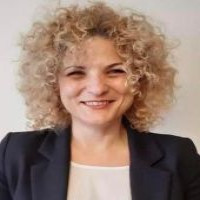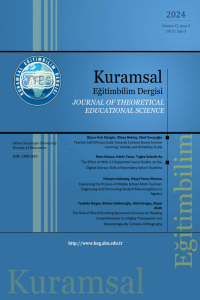Research Article
Aim & Scope
AIMS OF JTES
- JTES is a scientific, peer-reviewed, and open-access electronic journal. We welcome both theoretical and practical research and reviews on education. JTES does not charge any fee for anything.
- JTES aims to shoulder an influential role in establishing an educational system where individuals can acquire the knowledge, skills, and competencies of the 21st century.
- JTES aims to contribute to the discussion of the educational policies in the world and the reorganization of these policies by collecting studies in all steps of education, ranging from elementary to higher education, on an international platform.
- JTES aims to establish a common ground in which scholars and teachers follow the trends in research and foster their academic development.
SCOPE OF JTES
Considering the aims above, JTES accepts the following submissions:
- Studies analyzing the current situation, problems, and positive sides in all steps of education, ranging from elementary education to higher education,
- Studies analyzing the subjects related to all stakeholders (learner, teacher, academic, publisher, curriculum designer, and so on) in the education system,
- Studies analyzing the academic social, cultural and emotional developments of all stakeholders in education system,
- Studies touching upon the educational problems in Turkey and other countries or the studies that contain comparative studies in different countries,
- Studies suggesting theoretical and/or practical models for educational problems.
However, JTES will analyze the quality of articles at
the very first step of the submission. Accordingly, the below studies will not
be accepted for the review process:
- Studies that offer a descriptive review of literature,
- Descriptive studies based on opinions of stakeholders,
- Basic metaphor studies,
- Descriptive quantitative studies using a single instrument and reporting
differences in terms of some variables,
- Correlational studies on a field that has been researched to a great extent,
- Studies that are not directly related to educational sciences,
- Qualitative studies that depend too much on the positivist paradigm, i.e., quantifying the findings without exerting a thorough qualitative analysis
- Studies that are too local, that do not depend on international literature
(%70 expected to be the literature in WoS or Scopus), and that are not related
to international readers.
- Studies of the authors with a line of publication records in predatory
journals.
PUBLICATION FREQUENCY
JTES publishes four times (January, April, July, and October) a year.
Author Guidelines
General Formatting Requirements
- Our journal only accepts manuscripts in English. Please prepare your manuscript using the title page and template of our journal in the Microsoft Word (doc.) format. To download the manuscript template (click here) and title page (click here).
- Our journal does not charge for article submission and processing fee. As there is no income of our journal, author(s) should have the responsibility of redaction, layout, proofreading and translation.
- Authors have the legal responsibility of the content of their studies. Also, the authors agree on the open-access policy, Creative Commons Attribution-NonCommercial-ShareAlike 4.0 International license and ethical principles of JTES upon their submission.
- Although we do not have a strict word limit, the length of the manuscripts is encouraged to be between 6000 and 10000 words.
- Due to ethical considerations, the repetitive submission of a published author is not advised. At least, authors are suggested to wait at least one year after their publication.
Manuscript Sections and Citation Rules
- There are no strict formatting requirements but all manuscripts must contain the essential elements needed to convey your manuscript, for example Abstract, Keywords, Introduction, Methods, Results, Discussion, Conclusions.
- As stated in the journal template, Turkish and English abstracts should be between 150 and 200 words. These abstracts should be followed by 3 to 5 keywords (Turkish abstract will be translated for free for the submissions of international authors).
- For all manuscripts reporting data from studies involving human participants, JTES requires that the study have received formal review and approval by an appropriate institutional review board or ethics committee. This review and approval should be described in the manuscript’s Methods section.
- If a multiple-author manuscript is accepted, JTES requires each author to provide a statement of responsibility detailing what he or she contributed to the manuscript.
- In Acknowledgement, authors might list those individuals who provided help during the research (e.g., providing language help, writing assistance or proofreading the article, etc.) or funding information.
- Our journal requires authors to follow APA 7.0 rules as in the Publication Manual of the American Psychological Association (7th Edition) for the in-text citation and references.
- Appendices should be added after References.
- Please use italics or quotation marks instead of bold options to emphasize a part of your texts.
Ethical Principles and Publication Policy
Journal of Theoretical Educational Science (JTES) base on producing, developing and sharing knowledge objectively within scientific methods.
Peer-reviewed articles ensure the application of scientific method and impartiality. In this scientific production, publishers, editors, authors, reviewers, and readers should comply with ethical principles. In this context, the publication ethics and open access policy of Journal of Theoretical Educational Science (JTES) require that all stakeholders of publication process comply with ethical principles in line with the guidelines and policies published by the Committee on Publication Ethics (COPE) in open access (For example, “Committee on Publication Ethics (COPE) Code of Conduct" and "Best Practice Guidelines for Journal Editors”).
If situations such as manipulating and distorting the data used in the articles and using fabricated data are detected, this situation will be officially reported to the institution where the author of the article works and the article will be rejected. Journal of Theoretical Educational Science (JTES) has the right to request the output files related to the analysis results from the authors according to the feedback given by editors and/or reviewers.
When the study prepared for publishing is produced from a book chapter, an unpublished report, and master thesis or doctorate dissertation, it should certainly be stated in Turkish and English on the first page of the study. (E.g., This article is extracted from my master thesis/doctorate dissertation entitled “…”, (Master Thesis/PhD Dissertation, ….. University, Afyon/Türkiye, 2023). This paper is the final version of an earlier announcement called “…”, not previously printed, but orally presented at a conference called “…”, the content of which has now been developed and partially changed.
Journal of Theoretical Educational Science (JTES) acknowledges The Higher Education Institutions Scientific Research and Publication Ethics Directive and TUBITAK Committee on Research and Publication Ethics Regulation.
General Actions Against Scientific Research and Broadcasting Ethics
a) Plagiarism: To show others' original ideas, methods, data or works as their own work, partially or completely, without reference to scientific rules,
b) Forgery: Using data that does not actually exist or has been falsified in scientific research,
c) Distortion: Falsifying the research records or the data obtained, showing the devices or materials not used in the research as being used, falsifying or shaping the research results in line with the interests of the people and organizations,
d) Republishing: To present repetitive publications as separate publications in academic appointments and promotions,
e) Slicing: Dividing the results of a research into pieces in a way that disrupts the integrity of the research and inappropriately and publishing in more than one issue and presenting these publications as separate publications in academic appointments and promotions,
f) Unfair authorship: Including persons without active contribution among the authors or not including those who are, changing the author's order in an unjustified and inappropriate manner, removing the names of those who have active contribution from the work in subsequent editions, having their names included among the authors by using their influence even though they have no active contribution,
Other types of ethical violations:
a) Not specifying the supporting persons, institutions or organizations and their contributions in the publications made as a result of researches conducted with the support,
b) To use the thesis or studies that have not yet been submitted or accepted as a source without the permission of the owner,
c) Not complying with ethical rules in researches on humans and animals, not respecting patients' rights in publications,
ç) To act contrary to the provisions of the relevant legislation in biomedical researches and other clinical trials related to humans,
d) Sharing the information contained in a work that has been assigned to review with others before it is published without the explicit permission of the owner of the work,
e) Misuse of the resources, places, facilities and devices provided or allocated for scientific research,
f) To make unfounded, unwarranted and deliberate allegations of ethical violations,
g) To publish the data obtained without the express consent of the participants in a questionnaire and attitude research conducted within the scope of a scientific study or if the research will be conducted in an institution, also without the permission of the institution,
ğ) To harm animal health and ecological balance in research and experiments,
h) Failing to obtain written permissions from the authorized units in research and experiments before starting the work.
i) Research and experiments in legislation or engage in activities contrary to the provisions on related research and experimentation of the international conventions that Türkiye is a party.
i) Failing to comply with the obligation of researchers and authorities to inform and warn those concerned about possible harmful practices regarding the scientific research,
j) Not using the data and information obtained from other persons and institutions in scientific studies, to the extent and as permitted, not to respect the confidentiality of this information and to ensure its protection,
k) To make false or misleading statements regarding scientific research and publications in academic appointments and promotions (YÖK Scientific Research and Publication Ethics Directive, Article 4).
Within the framework of ethical rules; Studies requiring Ethics Committee Permission to be evaluated in the journal are as follows:
1. All kinds of research conducted with qualitative or quantitative approaches that require data collection from participants using survey, interview, focus group study, observation, experiment, interview techniques,
2. Use of humans and animals (including material / data) for experimental or other scientific purposes,
3.Clinical researches on humans,
4. Research on animals,
5. Retrospective studies in accordance with the law on protection of personal data.
In this context, in studies to be evaluated in our journal;
1.Obtaining and indicating "Informed Consent Form" in case presentations,
2. Obtaining and indicating permission from the owners for the use of scales, questionnaires and photographs belonging to others,
3. It should be stated that the copyright regulations are complied with for the intellectual and artistic works used.
4. Editors ensure the protection of human and animal rights in the studies evaluated. Editors have the responsibility to refuse to work when there is no approval of the ethics committee on the subjects used in the study, and no permission for experimental research. In studies requiring ethics committee approval, information about the permission (name of the board, date and number) should be included in the method section and also on the first / last page of the article. In case reports, the information that the informed consent / consent form was signed should be included in the article.
Editors should:
• hold the following responsibilities that are based on the guidelines "COPE Code of Conduct and Best Practice Guidelines for Journal Editors" and "COPE Best Practice Guidelines for Journal Editors" published as Open Access by the Committee on PublicationEthics (COPE).
• be responsible for managing the review process and have the right to decline any submission in case of any conflict of interest.
• not have any direct personal and/or financial conflicts with their assigned manuscripts.
• should not be assigned to manuscripts if they are on the author list.
Authors should:
• submit original manuscripts that have not published before or not submitted to anywhere else for publication.
• indicate just the authors who contributed to the manuscript at the intellectual level.
• be ready for supply extra documents such as raw data, consent forms and permission forms.
• disclose their personal and financial relationships which might bias their study. Authors must declare 1) all sources of research funding, including direct and indirect financial support, supply of equipment or materials, or other forms of conflict of interest, which may have prevented them from executing and publishing unbiased research; 2) the role of the research funder(s) or sponsor (if any) in the research design, execution, analysis, interpretation and reporting; 3) Any other relevant financial and non-financial interests and relationships that might be considered likely to affect the interpretation of their findings or which editors, reviewers or readers might reasonably wish to know. This includes any relationship to the book/journal (for example, if editors wish to publish their own research in their own work).
• just submit their submission to one journal at a time.
• fill in the conflicts-of-interest section in the title page and explicitly state if any potential conflicts exist or not.
Reviewers should:
• decline the review process if any substantial conflicts of interest exists (Due to the blind review process, we remove all details about authors and their institutions but reviewers can retract from reviewing and warn the editor-in-chief about it.)
• agree to review only their subject of expertise in an unbiased and confidential manner.
• review the manuscript constructively and kindly, avoiding insulting.
• review the content of a manuscript objectively without considering issues such as gender, religion, and politics.
• consult the editor-in-chief in case of any doubt about the manuscript.
Peer Review Policy
• When the Editor-in-chief considers the manuscript appropriate for the journal policy and qualified enough for peer-review, Editor-in-chief assigns the manuscript to the relevant section editor or Editor-in-chief might assign reviewers itself.
• JTES operates a double blind review process. Appropriate and qualified studies are assigned to at least two reviewers based on their expertise, from different universities.
• Author(s) identity is removed from the manuscript and shielded from the reviewers during the review process. The reviewer is left with only the manuscript without any information that might enable him/her uncovers the identity of the author(s).
• Reviewers are given 15 days for review but this time length can be extended by Editor-in-chief and/or section editors. If reviewers do procrastinate for a long time, Editor-in-chief and/or section editors might assign new reviewers.
• Reviewers make one of the following recommendations: accept, accept with minor revisions, major revisions to review again, and reject.
• When reviewers accept a manuscript, Editor-in-chief and/or section editors have the right to accept the manuscripts based on the reviews and to reject by clarifying the reasons for protecting the quality of manuscripts and the prestige of journal.
• The manuscripts that are accepted by reviewers for publication with major or minor corrections are decided to be published if corrections are done in a given time period. If not, the manuscripts can be rejected. Therefore, authors should request extra time with an excuse for not causing a rejection.
• When the manuscripts receive one acceptance and one rejection by reviewers, Editor-in-chief and/or section editors decide to publish the manuscript based on the decision of the third reviewer.
• The manuscripts that are rejected by at least two reviewers are decided to be rejected. Editor-in-chief and/or section editors do not have the right to change this decision.
• Editor-in-chief checks the quality of reviews. If reviewers accept or reject a manuscript without reasoning it, Editor-in-chief might assign extra reviewers to finalize the review process.
• The review reports are sent to authors in all cases.
• The author(s) retains the right to appeal against the review reports of reviewers. The appeal of authors will be examined by the Editorial Board. If Editorial Board considers the author(s) right for their appeal, new reviewers are assigned for a decision.
Duties of Editors and Editorial Board
• The Publisher and the Editorial Board are completely responsible for deciding which of the manuscripts submitted to the journal should be published.
• The Editor makes an impartial decision on publication by evaluating the intellectual content of the manuscript. The evaluation of the manuscripts must be accomplished in an objective and nondiscriminatory way.
• Editorial decisions are not influenced by the origins of the manuscript including nationality, ethnicity, political beliefs, race, or religion of the authors.
• The Editor does not accept a manuscript for publication in the event that there are sufficient grounds to suspect plagiarism.
• Editors reserve the right to reduce and to edit the text of articles.
• Editors do not allow any possible conflict of interests to arise.
• In cases of suspected publication misconduct by any participant of the editorial process, public investigation must be pursued.
Duties of Reviewers
Reviewers form the cornerstone of the peer-review process, and their evaluations ensure the quality of published research. Contribution to Editorial Decisions – Peer review assists the editor in making editorial decisions and through the editorial communications with the author may also assist the author in improving the paper. Every paper is reviewed by a minimum of two experts, who have all the opportunity to make an impartial evaluation regarding the level and clarity of the material presented.
Peer reviewers make an expert review of a manuscript in accordance with the following principles:
• to provide an objective and substantiated estimation of results presented in the manuscript. Personal criticism of the author(s) is not allowed.
• to notify the Editor if he/she does not have the expertise to assess all aspects of the manuscript or cannot be impartial because of conflict of interests. He/she should ask the Editor to excuse himself/herself from the review process.
• to identify relevant published work that has not been cited by the authors. Any statement that an observation, derivation, or argument had been previously reported should be accompanied by the relevant citation.
Duties of Authors
• to report precisely the originality and significance of their research;
• to submit only original work and use citations for any already reported material;
• to avoid self-plagiarism (attempt to republish own previously published work without significant changes),
• to ensure that the article is an exclusive material and has not been previously published or sent to other journals;
• to take full responsibility for the content, scientific context and legal aspects of their manuscripts;
• to inform the editorial board about errors in the article at any stage of material processing or after the publication of the article;
• to participate in the process of reviewing.
Author and Reviewer Fees
Authors are not charged for submission, processing and publication of papers. Peer reviewers are not paid for the peer reviewing.
Plagiarism Policy
• JTES does not accept plagiarism in any of its publications, and holds the right to use plagiarism detection software (intihal.net) to check all manuscripts. Submissions containing suspected plagiarism, in whole or part, will be rejected. If plagiarism is discovered post-publication, we will follow our guidance outlined in the Retractions, Corrections and Expressions of Concern section of these guidelines. We expect our readers, reviewers and editors to raise any suspicions of plagiarism by contacting the relevant editor
• Authors are expected to upload their originality report of their manuscripts. If authors are not able to do it, JTES has the right to check all manuscripts through a originality detection software such as iThenticate or Turnitin. Editors give a final decision by checking the similarity report. High similarity rates might cause editorial rejections. If there are minor problems, authors might be asked to decrease the similarity. Authors are responsible for the similarity percentage of their manuscripts.
• Papers presented at conferences can be submitted to the JTES. However, authors are expected to give this information in the title page, and the similarity rate should be as low as an original manuscript. The similarity rate will be analyzed again to prevent from any ethical problem.
Duplicate and Redundant Publication
JTES does not support substantial overlap between publications, unless:
• it is felt that editorially this will strengthen the academic discourse; and
• we have clear approval from the original publication; and
• we include citation of the original source.
We expect our readers, reviewers and editors to raise any suspicions of duplicate or redundant publication by contacting the relevant editor. When authors submit manuscripts to our journals, these manuscripts should not be under consideration, accepted for publication or in press within a different journal, book or similar entity.
Retractions, Corrections and Expressions of Concern & Post-Publication
Retractions, revisions, and expressions of concern will be considered by journal editors in accordance with COPE's Retraction Guidelines. Retractions are usually reserved for articles that are so seriously flawed that their findings or conclusions should not be relied upon, or that contain substantial plagiarism or life-endangering content. Journals that publish Accepted Manuscripts may make minor changes such as those which would likely occur during copyediting, typesetting or proofreading, but any substantive corrections will be carried out in line with COPE’s Retraction Guidelines.
Copyright Policy
• The manuscripts submitted to JTES for publication should be original ones that have not published before or not submitted to anywhere else for publication.
• Authors agree on the requirements of the open-access policy and Creative Commons Attribution-NonCommercial-ShareAlike 4.0 International license. They also accept to disclaim the copyright of the study by submitting to JTES.
• Since Authors acknowledge transferring the copyright of their studies to JTES, the Editorial Board of JTES hold the rights to continue publication processes. Therefore, Author(s), who want to withdraw their submission, have to send an article withdrawal request to JTES. Their withdrawal request will be evaluated by the Editorial Board of JTES, and the decision will be sent to Author(s) within a week.
The following rights of Author(s) are reserved:
• Patent rights,
• All unregistered rights apart from copyright,
• Duplication rights on condition that the study is not sold,
• The right to use the whole or parts of the study in the author's own books or other academic studies on condition that reference is given,
• The right to publish the study on personal websites or open archive of their university on condition that the copyright details are provided.
Archiving
JTES uses LOCKSS archiving system for electronic backup and preservation of access to the journal content.
• The hosting and DOI fees are covered by TÜBİTAK ULAKBİM. TÜBİTAK ULAKBİM provides academic journals published in Turkey with online hosting services and an editorial workflow management system for via DergiPark platform. DergiPark supports national academic journals to gain presence in accordance with international standards and increase their visibility.
• All other costs of the JTES journal are covered by Afyon Kocatepe University and its Faculty of Education budget.
• As a journal of a public university, we do not advertise anything with or without fees.
• We do not market and sell any service from the website of the journal.
Price Policy
There is no article processing and submission charges for our journal.
Indexes
Journal Boards
Owner on behalf of Afyon Kocatepe University
Editor-in-chief

Fatih Güngör is an associate professor and head of the Foreign Languages Education Department at the Faculty of Education, Afyon Kocatepe University. He is also the editor-in-chief of the Journal of Theoretical Educational Science indexed in ERIC and ULAKBİM TR Dizin. His main research interests are academic writing, corpus linguistics, and teacher education.
Assistant Editor

Mehmet Ertürk Geçici is currently working as an Assistant Professor in the Department of Mathematics and Science Education at the Faculty of Education, Afyon Kocatepe University. Since 2019, he has held various positions at the Journal of Theoretical Educational Sciences. His main areas of research include problem solving, problem posing, and visual reasoning in mathematics education.
Editorial Board

Dr. Arlinda Beka is a distinguished Associate Professor at the Faculty of Education, University of Prishtina, where she currently chairs the doctoral school, demonstrating her leadership in postgraduate studies. Her academic and professional endeavors are characterized by a strong focus on pivotal areas within education, including the development of early childhood curricula, rigorous educational in research, and the formulation of effective education policies. Dr. Beka's commitment to fostering global collaboration in sustainable development is evident through her active membership in the UNESCO network for Education for Sustainable Development.
Dr. Beka's dedication to continuous professional growth is further exemplified by significant international experiences that have enriched her perspective and expertise. These include a Fulbright Faculty Exchange at James Madison University in the USA and participation in other international professional exchange mobilities, facilitating the exchange of best practices and innovative pedagogical approaches.
Throughout her career, Dr. Beka has demonstrated versatility and a profound commitment to the advancement of education through her active engagement in a wide array of roles and projects. Her contributions reflect a deep-seated passion for shaping effective educational practices and influencing policy development to enhance learning outcomes.

Martin Bílek graduated from the Faculty of Education in Hradec Králové (Czechia) in the field of chemistry and physics teaching, obtained a Ph.D. in pedagogy at the Faculty of Education of Charles University (Prague, Czechia) and was habilitated and inaugurated in the field of theory of chemistry teaching at the Faculty of Science at the Matej Bel University in Banská Bystrica (Slovakia).
Currently he works at the Faculty of Education of Charles University, where he has successively held the positions of Head of the Department of Chemistry and Chemistry Didactics, Vice-Dean for Science and Research and Vice-Dean for Lifelong and Distance Education. Prior to that he worked at universities in the Czech Republic (UHK, UJEP) and abroad (NTNU Trondheim, University of Maribor, Matej Bel University in Banská Bystrica, UKF in Nitra). In his professional activity he deals mainly with didactics of chemistry and his broader range of professional interests includes didactics of natural science and technical subjects, methodology of natural science cognition, pedagogical and disciplinary didactic research, use of ICT in education and other areas related to education and applied informatics. He is a member of a number of professional societies, scientific councils and expert committees, e.g. ad-hoc committees for pedagogical disciplines of the Slovak Higher Education Accreditation Agency or vice-chairman of the Committee of the Expert Group for Chemical Education of the Czech Chemical Society. He is or has been an investigator of MOST projects from Horizon2020, MaSciL from EU FP7 or GEM from EU LC programme, several projects of GAČR, TAČR and other scientific and development projects. He has published in journals focused on science education and applied informatics and is the author of several monographs, e.g. Didactics of Chemistry - Research and Undergraduate Teaching, Towards Virtualization of School Experimental Activities, Psychogenetic Aspects of Didactics of Chemistry, Interaction of Real and Virtual Environment in Early Science Education: Tradition and Challenges and Natural Science Education in the Information Society. ID ORCID 0000-0002-1076-4595

Ali Yildirim is Professor of Pedagogical Work at University of Gothenburg in Sweden. He received his Ed.D. degree from Columbia University in 1993, and later worked at Middle East Technical University in Turkey for 25 years. He provided consultancy to Turkish Ministry of Education in nationwide research projects such as national achievement testing, parent education and vocational education. He served as educational consultant to World Bank financed projects in Turkey such as Preservice Teacher Education Development Project. Currently, he leads Didactic Classroom Studies with around 50 researchers at University of Gothenburg. His research interests include teaching and learning processes, curriculum planning and assessment, teacher education, and social studies education. His published books and articles focus on teacher education, instructional planning, thinking and learning skills, teaching of social studies and qualitative research. e-mail: ali.yildirim@gu.se https://www.gu.se/en/about/find-staff/aliyildirim, https://www.gu.se/en/research/didactic-classroom-studies, https://www.gu.se/en/research/sallt, https://www.gu.se/en/research/mentor-growth, https://www.usn.no/english/for-partners/teacher-research-literacy/

Educational Technology and Computing

Prof. Dr. Mehmet Şükrü Bellibaş completed his undergraduate education in Educational Sciences at Istanbul University (2009) and his doctorate in Educational Administration at Michigan State University (2014). Bellibaş, who became an Associate Professor in 2017, became a Professor in the field of Educational Sciences in 2024. Prof. Bellibaş currently works for the University of Sharjah in the United Arab Emirates. Prof. Bellibaş has more than 50 articles published in journals indexed in respected national and international directories. Prof. Bellibaş's research area is educational administration.


Bülent AYDOĞDU is a Professor in the Department of Mathematics and Science Education, Faculty of Education, Afyon Kocatepe University. He teaches STEM Applications and Scientific Research Methods at the graduate level, and science education, interdisciplinary science education, science curriculum, approaches to science learning and teaching, material design in science education, laboratory safety, and experimental techniques at the undergraduate level. His research interests include science education, STEM, STEAM, E-STEM, science laboratory, science process skills, argumentation-based learning, teacher education, and inquiry-based learning. He has also served as a director or researcher in numerous TÜBİTAK, European Union, and BAP projects.


















